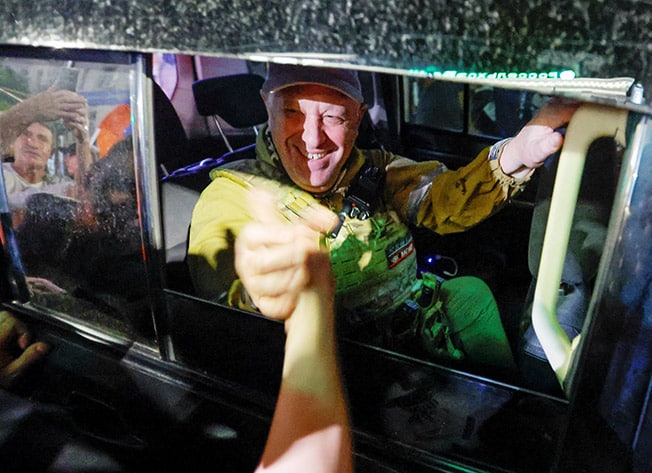He dared to challenge the authority of Vladimir Putin. Two months later, he was dead.
Yevgeny Prigozhin, who Russian authorities said was killed in a plane crash north of Moscow on Wednesday, led his Wagner private army out of the shadows and on to the frontlines of Russia’s war in Ukraine, before overplaying his hand in a risky power struggle with the military establishment.
His jowled face, shaven head and booming voice made him instantly recognisable in Russia and around the world as he hurled abuse at Defence Minister Sergei Shoigu and Chief of the General Staff Valery Gerasimov, accusing them of starving his fighters of the supplies they needed.
In one extraordinary video, he shouted and cursed at Shoigu and Gerasimov, demanding ammunition so his men could keep fighting as he stood in a field littered with the corpses of Wagner fighters.
For months, Prigozhin kept escalating his feud with the top brass, crossing a series of lines as many wondered, in Russia and outside the country, why Putin allowed him to rage unchecked.
He accused the defence chiefs of treason. At one point he threatened to withdraw his men – their ranks bolstered by convicts he had personally recruited – from the Ukrainian city of Bakhmut where they had fought the longest and bloodiest battle of the war.
Prigozhin performed a U-turn and Wagner fought on, eventually capturing the city in late May. But a turning point came weeks later when he rejected an order for Wagner fighters to sign contracts placing them under the control of the defence ministry.
ARMED REVOLT
On June 23, he launched an outright mutiny, seizing control of the southern city of Rostov and then advancing toward Moscow.
“Those who destroyed our lads, who destroyed the lives of many tens of thousands of Russian soldiers, will be punished. I ask that no one offer resistance,” he said in one of a series of frenzied audio messages.
“There are 25,000 of us and we are going to figure out why chaos is happening in the country,” he said, promising to tackle any checkpoints or air forces that got in Wagner’s way.
Putin went on television the next day to denounce the mutiny as a “stab in the back” and promised a harsh response. But within hours the revolt was defused with a deal: The Kremlin said that in order to avert bloodshed, Prigozhin and some of his fighters would leave for Belarus and a criminal case against him for armed mutiny would be dropped.
For weeks, confusion surrounded the implementation of the deal, the status of Prigozhin and his whereabouts. The Kremlin said he attended a meeting with Putin five days after the mutiny. On July 5, state TV said an investigation against him was still being pursued, and broadcast footage showed cash, passports, weapons and other items it said were seized in a raid on one of his properties.
Two weeks later, a video appeared to show Prigozhin welcoming his fighters to Belarus. At the end of the month, he was photographed in St Petersburg while a Russia-Africa summit was taking place in the city.
His ability to move in and out of Russia apparently with impunity raised new questions about why Putin continued to tolerate him.
“In six months, Prigozhin will either be dead or there will be a second coup. I’m agnostic between the two but I can’t see neither of these happening,” Christo Grozev, an investigative journalist with Bellingcat, told the Financial Times earlier this month.
Putin on Thursday described Prigozhin as a man who had made serious mistakes in life but a talented person who had fought for the “common cause”. He expressed his “sincere condolences” to those who died on the plane.
BUSINESSMAN AND WARLORD
Prigozhin emerged from years of operating behind the scenes to become arguably the most visible player in Russia’s war after Putin himself. This caught many by surprise and was widely seen as a sign that he harboured long-term political ambitions to cap his unlikely rise from hot-dog seller and small-time criminal.
Born in St Petersburg on June 1, 1961, he spent nine years in Soviet prisons for crimes including robbery and fraud. Released in 1990 amid the Soviet Union’s death throes, he launched a career as a caterer and restaurateur in his hometown.
He is believed to have met Putin, then a top aide to St Petersburg’s mayor, at this time.
Taking advantage of his political connections, Prigozhin was awarded major state contracts, becoming known as “Putin’s chef” after catering for Kremlin events. More recently he joked that “Putin’s butcher” would be more appropriate.
He built up a huge portfolio of interests across many countries, including in real estate, media and minerals. The U.S. accused his operations of manipulating voters in the 2016 presidential election – something Prigozhin himself last year admitted – in favour of Donald Trump.
And to the last, Prigozhin was intent on drumming up business.
He hailed a coup in Niger last month as a blow against “colonisers” and offered his fighters’ services to bring order. As recently as Tuesday, he posted a video which he suggested was shot in Africa.
“The temperature is +50 – everything as we like,” Prigozhin said, standing in a desert area with a rifle in his hands. The clip was accompanied by a phone number for people wishing to sign up.
Prigozhin’s death raised a host of questions, not least surrounding the future of his business empire and the fallout for Putin and the war in Ukraine.
“The mutiny of E.V. Prigozhin is over. And everything is just beginning,” political analyst Stanislav Belkovsky said.







Click here to change your cookie preferences